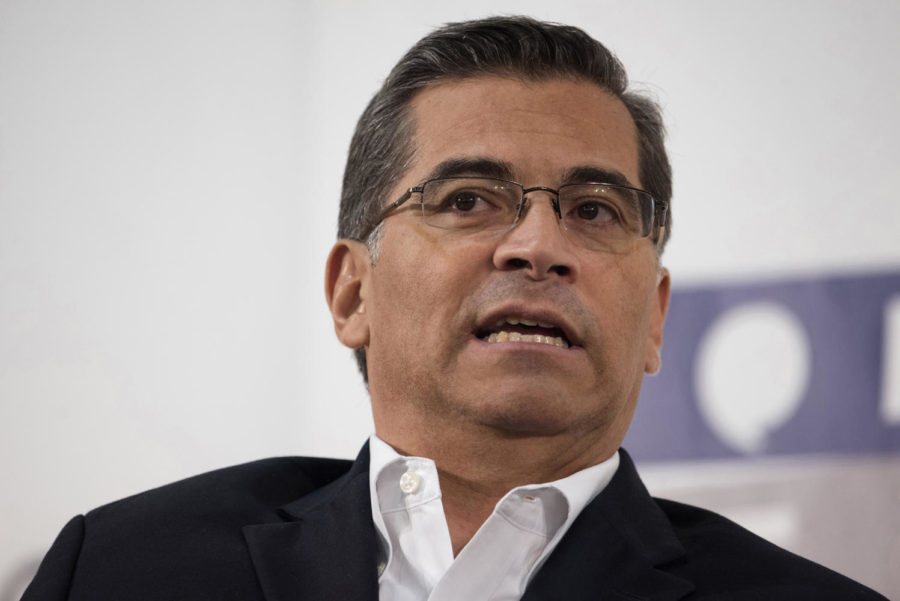SAN FRANCISCO — Democratic attorneys general spent the past 16 months suing the current administration at a record pace, often thwarting President Donald Trump’s most ambitious policy maneuvers with lawsuits questioning their constitutionality.
While the most prominent of Trump’s critics, New York Attorney General Eric Schneiderman, resigned a week ago after being accused of assaulting four women, there’s no shortage of attorneys general willing to fill any gap. Indeed, officials from California and New York insist nothing about their coordinated litigation strategy will change — a strategy they’re counting on to carry them through 32 crucial elections in November. And many say that with Barbara Underwood — a former U.S. solicitor general — filling in as acting New York attorney general, collaboration may even improve.
“States are protecting their people, values and economy, and that will continue as leaders throughout the country continue to emerge to resist and persist,” California Attorney General Xavier Becerra said in a statement. “New York has and will continue to be a leader in our fight for forward-leaning values, opportunity and the rule of law.”
As a divided Congress in Washington posed little opposition to the administration, Democratic attorneys general dubbed themselves “the last line of resistance” against the president. Beginning with a coordinated effort to halt the first of Trump’s trio of travel bans, those state AGs laid the groundwork for litigation that followed to block his anti-sanctuary city policy, plan to deport children of undocumented immigrants, environmental deregulation and edicts targeted at gay and transgender Americans, among others.
Democratic attorneys general from 23 states filed a combined 36 lawsuits against the Trump administration, and their record shows significantly more wins than losses. The greatest threat so far has been the U.S. Supreme Court, which appears poised to uphold Trump’s third, watered-down travel ban. Their own influence could be directly threatened if voters shrink the list of Democratic top cops in November.
Our AGs have played the role of checks-and-balances against the Trump administration,” said Sean Rankin, executive director of the Democratic Attorneys General Association in Washington. “Democratic attorneys general have been extraordinarily successful in the courts, not only checking federal overreach but acting to ensure the Trump administration understands the rule of law.”
Schneiderman was quick to take the lead on a flurry of high-profile lawsuits against the Trump administration’s policies, but his departure will highlight emerging leaders rather than leave an influence gap.
“There’s no doubt that we’ll see a new line of leaders take up the cause — Maura Healey, Josh Shapiro, Xavier Becerra, Bob Ferguson, Hector Balderas are all stepping up,” said Oregon Attorney General Ellen Rosenbloom, co-chair of DAGA, referring to her peers from Massachusetts, Pennsylvania, California, Washington and New Mexico, respectively. “We lost a colleague, but nothing changes. If anything, we’re more committed to working together.”
DAGA is hopeful they’ve bought credibility with voters through that record, setting sights on expanding the number of states with Democratic AGs across the country, including crucial races in Michigan, Ohio, Wisconsin, Nevada, Colorado, Georgia, Alabama, Arkansas and Florida.
Balderas from New Mexico, Healey of Massachusetts and California’s Becerra are among the 14 Democrats fighting for their jobs against candidates backed by Trump’s fundraising machine. In November, the Republican Attorneys General Association hosted a fundraiser at Trump’s Mar-a-Lago resort, contributing to the $21 million RAGA has raised for the 2018 elections.
For the 32 races in the first quarter of 2018, DAGA has raised about $2.7 billion compared to RAGA’s $5 billion. While Rankin says this doesn’t include funds raised by the candidates themselves, RAGA Chairwoman Leslie Rutledge sees a resource advantage for Republicans.
Rutledge, also Arkansas’ attorney general, is preparing to steal away seats in Illinois, Connecticut and Maryland to slash the number of states supporting the causes of New York and California, who’ve led litigation against Trump’s agenda. While Arkansas supported Texas’s litany of disputes against perceived overreach by the Obama administration, Rutledge reconciles that history and her present plans by arguing that Democrats are suing at a faster pace with an obstructionist agenda in mind.
“Our democratic colleagues have really politicized the office much more so than we ever even considered,” said Rutledge. “Welcome to the concept of states’ rights, Democrats. But this is isn’t about blatant disregard for the rule of law that we saw under President Obama. It’s an attempt to shape policy through courts that they weren’t able to when they had control.”
A few of those 36 lawsuits:
—22 AGs sue FCC over net neutrality — 1/16/2018
—Led by New York, 11 AGs sue EPA for scaling back clean water regulations — 2/6/2018
—Led by New York, 16 AGs sue EPA for scaling back auto emission standards — 5/1/2018
—Led by California, 19 AGs sue Trump administration over Affordable Care Act — 10/13/17
—Led by California, 2 AGs sue EPA over out-of-state air pollution — 1/17/18
— Led by NY & Conn., 3 AGs sue Department of Education over for-profit student loans — 12/4/2017
—2 AGs sue Department of interior for blocking oil and gas royalties — 4/26/2017
—2 AGs sue Trump’s private entity over its financial relationship with governments — 6/12/2017
– California sues EPA over failure to comply with open records act — 8/11/2017
— California intervenes alone in lawsuit challenging transgender military ban — 11/8/2017
———
(Dimitrios Pogkas contributed to this report. )


